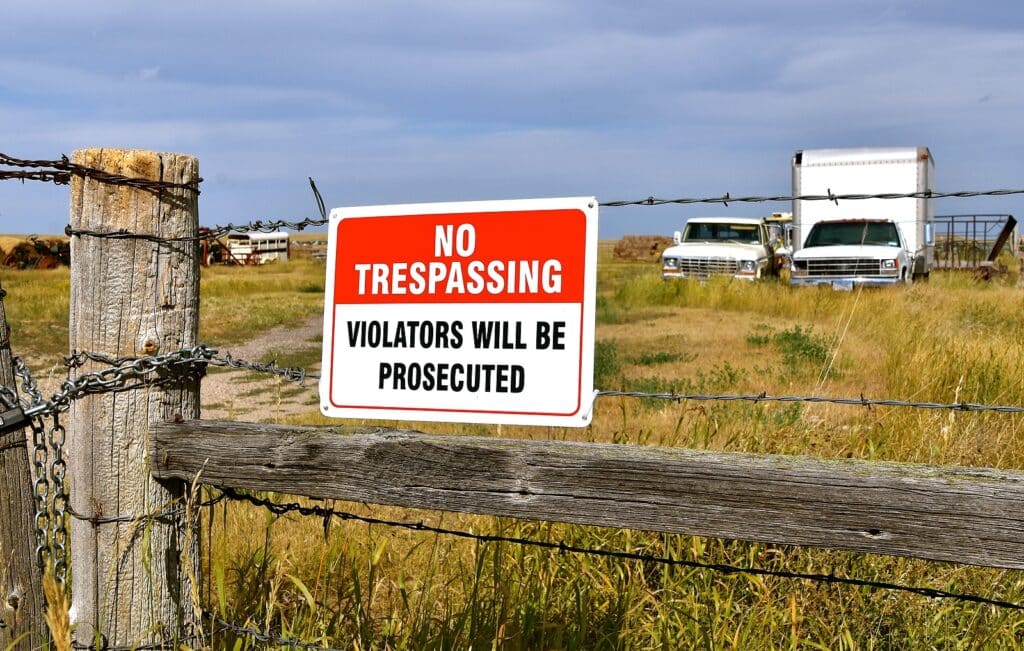Key Takeaways:
- Trespassers in Wisconsin are individuals on property without the owner’s consent, regardless of intent.
- Property owners generally owe no duty of care to trespassers but cannot intentionally harm them (e.g., setting traps).
- An exception exists for children—owners may be liable if unsafe conditions attract children and reasonable safeguards were not taken.
- Wisconsin’s comparative fault system reduces or bars recovery if the trespasser is more than 51% at fault.
- Injured trespassers should seek medical help, document the scene, and consult a personal injury lawyer.
Do I Have a Case Against the Property Owner if I Was Injured While Trespassing?
Generally, most law-abiding citizens attempt to stay off the property of others if they do not have permission to be there. However, situations do occur where an individual may be trespassing without realizing it. This can happen in a number of ways:
- Property boundaries may not be clearly marked in rural areas or hunting land.
- Unknown to you, commonly traversed shortcuts to public land may cross through private property.
- You could be dropping in to welcome a new neighbor without their knowledge or consent.
If you suffer an injury while trespassing in Wisconsin, what legal rights do you have? Can the property owner be held liable for damages? A knowledgeable personal injury lawyer can address some of these challenging questions. If you are facing this legal dilemma, it is critical to promptly schedule a case evaluation with a lawyer because every situation is unique, and the details can impact the outcome of your claim.
What is a Trespasser?
A trespasser is legally defined as an individual on a property without the express or implied consent of a possessor of that property.

The possessor of a property can include owners, renters, tenants, lessees, or anyone else who is lawfully occupying the property. Intent to trespass does not have to be demonstrated for a person to be considered a trespasser.
What Duty of Care is Owed to Trespassers in Wisconsin?
Under Wisconsin state statutes, a property owner owes no duty of care to a trespasser in most circumstances. However, the owner cannot willfully, wantonly, or recklessly kill or injure a trespasser. For example, a property owner cannot legally set up traps on their property with the intent to harm anyone who may enter. If a trap injured you, you would have cause to bring a personal injury claim.
While property owners have a general duty not to cause intentional injury to trespassers, this rule is superseded by a person’s right to use reasonable and necessary force to defend themselves, their property, and others if they believe they are in imminent danger of harm. This area of the law can become complex, so it is recommended to speak with an experienced premises liability lawyer if the property owner claims self-defense after an incident.
How Does the Duty of Care Change if the Trespasser is a Child?
The main exception where a property owner can be held liable for injuries suffered by a trespasser on their property occurs when the trespasser is a child. Children do not have the knowledge and awareness of adults, so they may unwittingly go onto others’ property and explore areas that could be dangerous. Property owners are responsible for securing their property and taking measures to make it safe if it is foreseeable that children may trespass on the premises.

Under the law, all five of these facts must be proven for a property owner to be held responsible for the injury or death of a child trespasser on their property:
- There was a condition on the property that was not natural that could cause harm to a child, and the property owner maintained it or allowed it to exist.
- The property owner was aware or should have been aware that children were trespassing on the property.
- The property owner knew or should have known that a condition on their property could cause serious injury or death to a child.
- The child injured or killed was unaware of the risks posed by the condition on the property due to their age.
- There were reasonable safeguards that the property owner could have taken to make the dangerous condition safer without materially interfering with its use or purpose.
How Could Wisconsin’s Comparative Fault System Impact My Claim?
Wisconsin operates under a modified comparative fault system with a 51% bar for personal injury claims. Under this system, a plaintiff can bring a claim against a defendant as long as they are not more at fault for the incident than the defendant. For plaintiffs with a valid claim, their damages will be reduced in proportion to the amount of fault they share in the accident.
This system can make it challenging for victims who were trespassing to recover compensation. The illegality of the act of trespassing can often be used as evidence of the victim’s fault and may bar them from recovery in all but the most unusual circumstances. However, exceptions do exist, and only an experienced Wisconsin personal injury lawyer can provide a legal opinion on the merits of your case.
What Should You Do if You Have Been Injured While Trespassing?
Any time you are injured on another’s property, there are steps you should take to safeguard your health and protect your legal rights. First, you should get emergency medical attention if the injury is severe. Even if you have seemingly minor injuries, you should seek a prompt medical evaluation for your well-being and to create a medical record of the incident.

The other crucial step is recording the scene of the accident. Take pictures or videos with your phone to document the area. Property owners could try to fix issues afterward, so it is critical to have proof of the conditions at the time of your injury.
You may have legal options if you have been harmed on someone else’s property, even if you were trespassing. Contact our personal injury law firm today to schedule a free consultation on your case.




